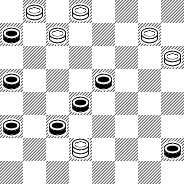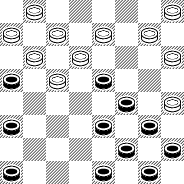The Checker Maven
Jump to navigationWho's Number One?



After today's play (27 May 2005) Alex is leading Ron 5 to 2 with 13 draws. This is spirited, fighting checkers - how often do we see 7 out of 20 grandmaster games end in a victory? But no matter who finally emerges from this battle as the present-day Number One, we're seeing checkers at its very best.
(Editor's note, 01 June 2005: Alex wins the match with a score of 8 wins, 3 losses, and 25 draws!)
Right now, though, we want to take you back to an earlier contest for the claim to the title of Number One, a match held in the U.K. in 1958 between the American great Marion Tinsley and the British grandmaster Derek Oldbury. Tinsley walked out the undisputed world champion with nine wins, one loss, and 24 draws. Despite the seemingly uneven score, the match was hotly contested and produced some very fine play.



Here's a position from the very first game of the match:

BLACK (Tinsley)
Black to Play and Draw
Now let's leap ahead to Game Seven. Here's the situation:

BLACK (Oldbury)
Black to Play and Draw
Click on Read More to see how your play stacks up.
Solutions
Game One
18-22* 7-16 22-29 16-11 15-18* 31-26 20-24* 27-20 29-25 11-15 25-30 14-2 30-23 was given afterwards in analysis by Tinsley to draw. There are many variations and side lines; it might be interesting to set this up on your computer and investigate further.
Game Seven
Tinsley's post-game analysis gives 10-15 19-10 6-15 13-6 1-10 26-22 4-8 22-17 8-11 25-22 18-25 29-22 2-7 (or 5-9 17-13 2-7) for the draw.
The full games, with detailed analysis and narrative commentary, appear in International Draughts and Checkers, a book co-authored by the truly Number One team of W.R. Fraser, Tom Wiswell, Marion Tinsley, and Derek Oldbury. If you don't have this incredibly wonderful book, you should look for it and buy it at whatever price is asked.
How did you do with these two situations? Are you now ready to take a run at the Number One slot yourself?
For our part, we think we'll settle for enjoying the Moiseyev-King match as it progresses!
You can email the Webmaster with comments on this article.
